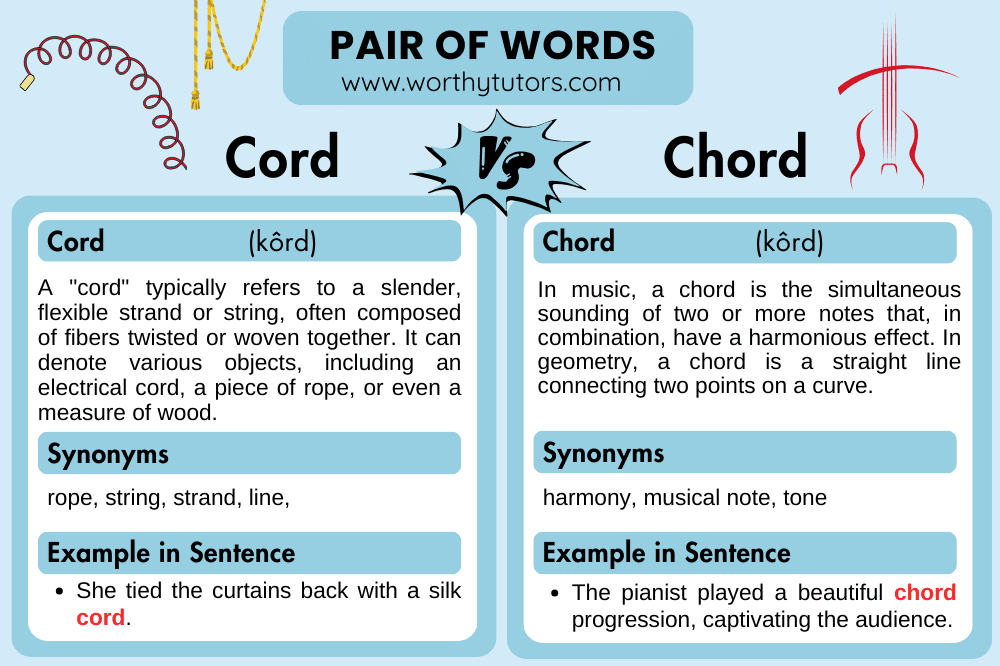
Differences Between “Chord” and “Cord”
In the dictionary book of English language, confusion often arises when encountering words that sound similar or have slight variations in spelling. One such pair that frequently perplexes students is “cord” and “chord.” Despite their close resemblance, these words carry distinct meanings and applications, contributing to the challenge of differentiation. This article will explore these two terms, providing a clear understanding of their pronunciation, synonyms, meanings, usage, examples, and a conclusion.
Chord
Pronunciation of Chord
Chord (kôrd)
Meaning of Chord
In contrast, a “chord” refers to a group of musical notes sounded together, typically forming harmony. It can also denote a straight line segment that joins two points on a curve.
Etymology and Explanation of Chord
Derived from the Greek word “khordē,” meaning “gut” or “string of a musical instrument,” the term “chord” entered English via Old French as “corde.” In music, a chord is the simultaneous sounding of two or more notes that, in combination, have a harmonious effect. In geometry, a chord is a straight line connecting two points on a curve.
Synonyms of Chord
Synonyms for “chord” include harmony, musical note, tone, and concord.
Example of Chord in Sentences
- The pianist played a beautiful chord progression, captivating the audience.
- He strummed the guitar, producing a resonant chord that echoed through the room.
- The composer experimented with different chord combinations to evoke varying emotions.
Cord
Pronunciation of Cord
Cord (kôrd)
Meanings of Cord
A “cord” typically refers to a slender, flexible strand or string, often composed of fibers twisted or woven together. It can denote various objects, including an electrical cord, a piece of rope, or even a measure of wood.
Synonyms of Cord
Synonyms for “cord” include rope, string, strand, line, and cable.
Etymology and Explanation of Cord
The word “cord” finds its origins in the Latin word “chorda,” meaning “string.” Over time, it evolved into the Middle English “corde,” retaining its fundamental notion of a slender, elongated object. This term is used to describe a variety of elongated, string-like materials used for binding, fastening, or connecting.
Example of Cord in Sentences
- She tied the curtains back with a silk cord.
- The extension cord reached from the outlet to the far corner of the room.
- The tailor carefully measured the fabric with a cord to ensure accuracy.
Summary
While “chord” and “cord” may sound identical, their meanings are distinct and context-dependent. “Chord” is a musical or geometric term, whereas “cord” refers to a type of binding material. Understanding the difference between these homophones is crucial for accurate communication, especially in written form.
Exercise
- She tied the package with a colorful ______. (Cord/Chord)
- The musician played a soothing ______ progression. (Cord/Chord)
- The electrician plugged in the ______ to power the lamp. (Cord/Chord)
- The mathematician drew a straight ______ on the graph. (Cord/Chord)

About Authoress
Mahnoor Jehangir is a seasoned educator and linguist, specializing in English language and literature. With a master’s degree in English and applied linguistics, Mahnoor serves as a subject lead, while also indulging her passion for writing, exploring the nuances of language and storytelling.